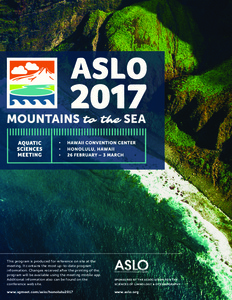Mostra el registre d'ítem simple
The module for ocean observatory data analysis of EMSO
| dc.contributor.author | Bardají Benach, Raúl |
| dc.contributor.author | Bartolomé de la Peña, Rafael |
| dc.contributor.author | Dañobeita Canales, Juan José |
| dc.contributor.author | García, Oscar |
| dc.contributor.author | Río Fernandez, Joaquín del |
| dc.contributor.author | Piera, Jaume |
| dc.contributor.other | Universitat Politècnica de Catalunya. Departament d'Enginyeria Electrònica |
| dc.date.accessioned | 2018-02-06T10:31:19Z |
| dc.date.available | 2018-02-06T10:31:19Z |
| dc.date.issued | 2017 |
| dc.identifier.citation | Bardají, R., Bartolomé, R., Dañobeita, J., García, O., Del Rio, J., Piera, J. The module for ocean observatory data analysis of EMSO. A: ASLO Aquatic Sciences Meeting. "Mountains to the sea : ASLO Aquatic Sciences Meeting 2017 M2C: Meeting abstracts". Honolulu: 2017. |
| dc.identifier.uri | http://hdl.handle.net/2117/113777 |
| dc.description.abstract | The European Multidisciplinary Seafloor and water-column Observatory (EMSO) is a large-scale, distributed, Marine Research Infrastructure (RI). EMSO consists of ocean observation systems for long-term, high-resolution, (near) real-time monitoring of environmental processes including natural hazards, climate change, and marine ecosystems. EMSO observatory nodes are at key sites around Europe, from the Arctic to the Atlantic, through the Mediterranean, to the Black Sea. To analyse the EMSO data, we develop the Module for Ocean Observatory Data Analysis (MOODA). MOODA is a software with a Graphical User Interface (GUI) developed for scientists. The software helps to facilitate data access (mainly off-line) for further analysis by the scientific community. Some of the features the MOODA offers are: (1) Direct data access with complex query capabilities; (2) Data filtering methods based on metadata information; (3) Complex visualization tools; (4) Summary reports of the validated data generated from a specific query, including event annotations; (5) Specific data analysis tools for different scientific disciplines; (6) The system will be designed to be open, adaptable and scalable allowing future contributions from researchers and developers from all the disciplines associated to the EMSO observatories. The code is written in Python, and it is available on GitHub. MOODA aims to make informative plots as a central part of exploring and understanding data. |
| dc.language.iso | eng |
| dc.subject | Àrees temàtiques de la UPC::Enginyeria civil::Geologia::Oceanografia |
| dc.subject | Àrees temàtiques de la UPC::Enginyeria electrònica::Instrumentació i mesura::Sensors i actuadors |
| dc.subject.lcsh | Ocean bottom -- Research |
| dc.subject.lcsh | Oceanography--Observations--Data processing |
| dc.title | The module for ocean observatory data analysis of EMSO |
| dc.type | Conference lecture |
| dc.subject.lemac | Fons marins -- Investigació |
| dc.subject.lemac | Oceanografia -- Observacions |
| dc.contributor.group | Universitat Politècnica de Catalunya. SARTI - Centre de Desenvolupament Tecnològic de Sistemes d'Adquisició Remota i Tractament de la Informació |
| dc.relation.publisherversion | https://www.sgmeet.com/aslo/honolulu2017/viewabstract.asp?AbstractID=29307 |
| dc.rights.access | Open Access |
| local.identifier.drac | 21880002 |
| dc.description.version | Postprint (published version) |
| dc.relation.projectid | info:eu-repo/grantAgreement/EC/H2020/676555/EU/EMSO implementation and operation: DEVelopment of instrument module/EMSODEV |
| local.citation.author | Bardají, R.; Bartolomé, R.; Dañobeita, J.; García, O.; Del Rio, J.; Piera, J. |
| local.citation.contributor | ASLO Aquatic Sciences Meeting |
| local.citation.pubplace | Honolulu |
| local.citation.publicationName | Mountains to the sea : ASLO Aquatic Sciences Meeting 2017 M2C: Meeting abstracts |




